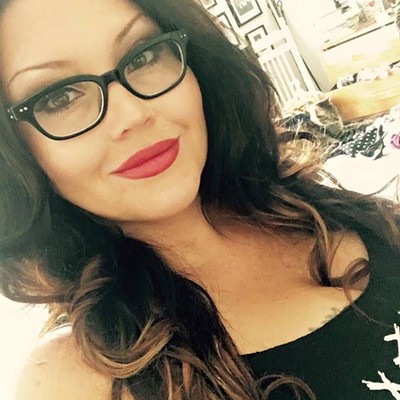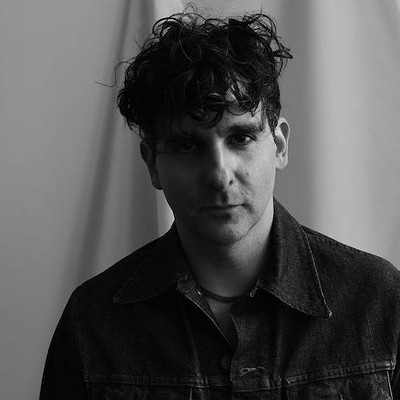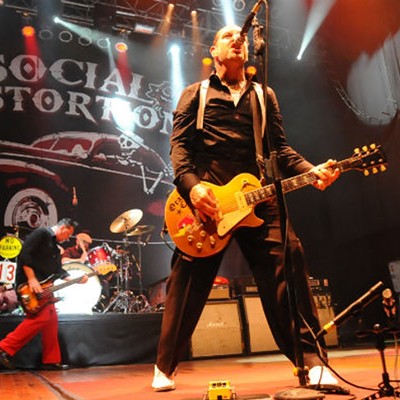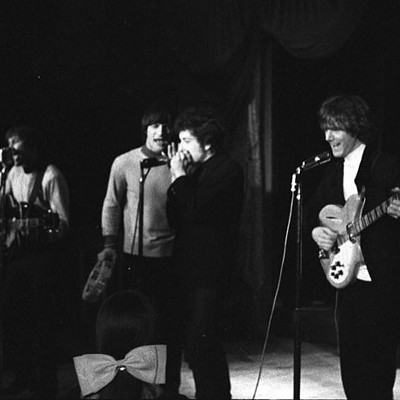The Bataclan in Paris has announced it will reopen its doors in due time. And sadly, in due time, the memory of the attacks that killed 130 people across that city on the evening of November 13 will fade further from the media spotlight.
Even as I write this now, my news feed has fewer mentions of ISIS, fewer French-flagged profile pics and almost nothing from GOP presidential candidate Donald Trump about creating a Muslim watchlist, targeting their families, investigating mosques and registering suspicious activity into a database for refugees.
Welcome to 1984, where suspicion and rumors are more frightening than actual facts.
One of the relatively few mentions of the Paris attacks this week was when President Obama’s visit to the UN's Climate Change Summit suddenly detoured to make a visit to Le Bataclan, where he paid respect to the victims. The attacks are still fresh, the building remains closed and funerals for most victims just wrapped up last week.
And for touring musicians especially, Paris looms on, a hauntingly reflexive, subconscious fear now permanently affixed to our collective understanding of what it means to attend a concert in Europe. The fear is real, too. Uncanny comparisons to 9/11 abound. Consider it — an ordinary day, civilians targeted, multiple locations at the hands of an extremist Islamic terrorist organization filled with young, disenfranchised men who believe terror will win their ideology.
And, just as in 2001, the great mass of musicians, artists and writers has remained uncharacteristically quiet in response.
Sure, there have been domestic terror attacks in entertainment venues and against entertainers, notably the Colorado theater massacre, the shooter who killed Dimebag Darrell, John Lennon, etc. But this is the first time a foreign terrorist group has attacked the music community — of fans. This time they targeted an audience who attends shows, listens to contemporary music, and hangs out with like-minded enthusiasts — you know, people exactly like you and me.
That fear instantly crippled music. In the wake of the Bataclan attack, bands like Foo Fighters and Motorhead, among numerous others, canceled performances in France. Most notably Lamb of God canceled their entire tour, and understandably so, despite severe criticism.
If this is music's only response to the the threat of terror, is it the right one? I'm not convinced.
Did we just allow ISIS to shut us down? It appears so.
But some bands absolutely refuse to remain terrorized. These bands have decided to remain on tour, and deserve to have fans packing the venues despite the fear and the threats. For that, they earn my applause and respect because we must carry on. Bands must perform, and fans must again come out to support them.
What else are we to do? Remaining at home barricaded against a perceived threat is not only counterproductive to healing, but also defeats the musicians who are still touring. Worse, it sends a message to the terrorists that they are in control. We can’t give into paranoia. In a strong stand of unity, we must continue supporting artists, especially those who refuse to cower to terror threats.
The few voices who have spoken out against ISIS, terrorism and violent criminal behavior all agree: The show must go on.
Even the Eagles of Death Metal plan to play Le Bataclan again, as stated in a recent interview: "“I want to be the first band to play in the Bataclan when it opens back up,” said front man Jesse Hughes. “Because I was there when it went silent for a minute. Our friends went there to see rock and roll and died. I want to go back there and live.”
His attitude is right, the sentiment courageous. When EODM does return to the venue, it will be historic.
Likewise, bands who are on familiar terms with both domestic and foreign terrorism echo Hughes. In an interview with The New York Times, Bono of U2 fearlessly said, “ISIS and these kinds of extremists are a death cult; we are a life cult." U2 is scheduled to make up their concerts that were canceled due to the attacks this Sunday and Monday.
But Bono isn't the only one who feels that way. “I’ve played [Le] Bataclan," Trevor Strnad of the Black Dahlia Murder told us recently. "I can’t imagine what [EODM] experienced, but in no way should people stop touring. If anything, we need to tour and even more."
Exactly. In that respect, artists' voices need to be louder; indeed, the loudest of this particular conversation.
Yet here in America, we've been paralyzed by yet more attacks. The media spotlight remains on our latest violent fixation and religious whack-job act of domestic terrorism, the Planned Parenthood attack and now, unfortunately, Wednesday's San Bernadino shooting and another in Georgia. That's two in one day and now, more this year than ever before in our nation's history.
And while sporadic, angry, ultra-conservative domestic terrorism persists and has become the uncomfortable norm in this country, it’s not the norm of the music community. At least not yet. Surely the fear of terroristic threat is still fresh, but we should never fail to understand that we Americans have a very real threat in the form of ourselves. Take a look in the mirror, 'Merica, we're killing ourselves more frequently than foreign terrorists, essentially, doing the job of ISIS for them.
Until Congress can effectively counter our own homegrown criminals, we will remain in a state of perpetual mass shootings. The wounds of terrorism cannot heal under constant attack. The force of our laws seem only to find their power in reactionary constructs; face it, those laws are failing us. It's only after an attack occurs can we diagnose the mentally ill, only after blood is shed that we make arrests, and only after another mass shooting can we send criminals to prison.
And who will speak out against this?
Instead of preventing the spread of disease in the first place, we just treat the symptoms, hoping that this violent cancer of our country will succumb in remission to the shock we all feel from the last mass shooting. That shock keeps us crippled, inept and unfocused, and we remain terrorized into inaction because we don't know what to do.
In our communal collapse and confusion following a mass shooting, while we feel numb and angry and begin to question our motives, influences and backgrounds, the next mass shooter is taking notes, making plans, growing more angry and more resolute.
Perhaps Trump could create a right-wing nutjob watchlist. You know, target those families who either encourage, coddle or dismiss such behavior, investigate hate groups, and register suspicious activity and political rhetoric that incites crime into a database. Because, you know, that could actually save lives. Sadly, perhaps that will never happen, and we will continue surrendering to the new threat of random mass-shooter attacks.
Yet even this begs a question of the artistic community: where is our activism?
Artists and musicians must speak to that growing aggression, the mounting grief and the continual shock of terroristic violence in our communities. We must rebel against our new status quo of violence and create a new counterculture of peace. We also must reject those who would push ideologies and philosophies that encourage a death culture.
Perhaps most importantly, we must be seen. Artists must continue to create, inspire and produce and in that sense they must also take up the protest that so many artists before us have done. Where are the songs of demur and outcries for peace? Where are the poets reciting verses to the masses, where are the writers drafting speeches to be heard across our land? Where is this generation's Guernica? Where is our Bob Dylan? Our Arthur Miller? Our Ida B. Wells? Where is Allen Ginsberg to deliver our Howl of outrage?
Where are our great demonstrations of challenge? I call upon my generation to wake up. If you're not outraged, you're not paying attention.
Historically speaking, no other group has more power to persuade public opinion and fan the flames of protest, inspire legislation and make change in our society. We must carefully craft the message in response to Paris, Planned Parenthood, San Bernadino, and anyone else who opposes peace: You will not win, we will not go home, we will not be silent.
Is this not our country, too?
How we react to these events as an artistic community needs to be as calculated at the attacks themselves. Our response needs to be united, precise and purposeful. Most importantly, it must remain peaceful. Art is the pulpit of dissent, and no greater force speaks to social change than artistic expression.
Rise up and be heard, creators. If not us, who?
Support Us
Houston's independent source of
local news and culture
account
- Welcome,
Insider - Login
- My Account
- My Newsletters
- Contribute
- Contact Us
- Sign out
[
{
"name": "Related Stories / Support Us Combo",
"component": "11591218",
"insertPoint": "4",
"requiredCountToDisplay": "4"
},{
"name": "Air - Billboard - Inline Content",
"component": "11591214",
"insertPoint": "2/3",
"requiredCountToDisplay": "7"
},{
"name": "R1 - Beta - Mobile Only",
"component": "12287027",
"insertPoint": "8",
"requiredCountToDisplay": "8"
},{
"name": "Air - MediumRectangle - Inline Content - Mobile Display Size 2",
"component": "11591215",
"insertPoint": "12",
"requiredCountToDisplay": "12"
},{
"name": "Air - MediumRectangle - Inline Content - Mobile Display Size 2",
"component": "11591215",
"insertPoint": "4th",
"startingPoint": "16",
"requiredCountToDisplay": "12"
}
,{
"name": "RevContent - In Article",
"component": "12527128",
"insertPoint": "3/5",
"requiredCountToDisplay": "5"
}
]
KEEP THE HOUSTON PRESS FREE...
Since we started the Houston Press, it has been defined as the free, independent voice of Houston, and we'd like to keep it that way. With local media under siege, it's more important than ever for us to rally support behind funding our local journalism. You can help by participating in our "I Support" program, allowing us to keep offering readers access to our incisive coverage of local news, food and culture with no paywalls.
Trending Music
- How Much Longer Can Classic Rock Rule the Roost?
- Top 10 Butt-Rock Bands of All Time
- Wang Chung Headline a Musical Time Trip to the '80s...and Land on the Moon!
-
Sponsored Content From: [%sponsoredBy%]
[%title%]

Don't Miss Out
SIGN UP for the latest
Music
news, free stuff and more!
Become a member to support the independent voice of Houston
and help keep the future of the Houston Press FREE
Use of this website constitutes acceptance of our
terms of use,
our cookies policy, and our
privacy policy
The Houston Press may earn a portion of sales from products & services purchased through links on our site from our
affiliate partners.
©2024
Houston Press, LP. All rights reserved.





